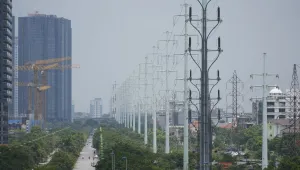In a bid to reduce their dependency on oil and natural gas revenues, GCC governments have recently invested considerable resources to diversify their economies.This paper provides an empirical assessment of economic diversification in the GCC for the period 1980-2005. In particular we assess whether oil and natural gas revenues, government policies and foreign flows of labor have contributed to greater economic diversification, proxied by real growth in non-hydrocarbon GDP per worker. To our knowledge, this is the first paper that analyzes economic diversification in the Gulf using panel data techniques that explicitly treat the GCC as an economic block.
We find that lagged hydrocarbon revenue is the only variable consistently associated with subsequent economic diversification; this is in contrast to government expenditures whose impact on diversification is negative, large, and significant. We also find that population growth has little impact on either growth of overall GDP per worker or non-hydrocarbon GDP per worker; we present an economic growth model that takes into account features of the labor market structure in the Gulf to explain this finding. Finally, we present some empirical evidence consistent with claims of greater macroeconomic and financial integration within the GCC.
Coury, Tarek and Chetan Dave. "Oil, Labor Markets, and Economic Diversification in the GCC: An Empirical Assessment." Working Paper, Dubai Initiative, Belfer Center for Science and International Affairs, Harvard Kennedy School, November 2009.




